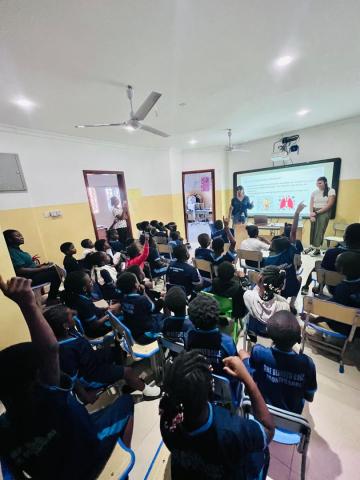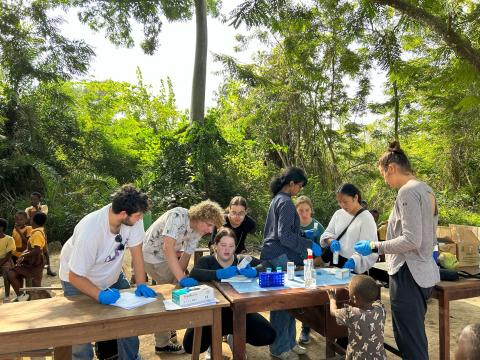I have been in Ghana for over a month now and time is really flying by. I am having an incredible time. We have visited the Central, Ashanti and Northern regions of Ghana, learning about cultural practices in each one. Central Region, home of Cape Coast, was especially interesting, as our Aya Centre program director grew up there, so she was able to tell us things we would not have known otherwise. It is also home to Kakum National Park, with massive canopy bridges we got to walk on, Elmina and Cape Coast slave castles and a beach we got to swim in. This was definitely a favorite weekend of mine!
Image
I have been enjoying my service-learning portion, in which I am in a local school, with kids from creche (ages 1-2) to grade five (ages 11-12). My classmate, Harini, and I have given a presentation on infectious diseases to the primary age students, teaching them about global health. The children call us Auntie Miriam and Auntie Harini, which we find so cute. Similar to Mexico, I love being able to understand the family aspect of all communities here in Ghana. Elders are respected, endearingly referred to as auntie and uncle. It is also common to hear people refer to each other as brother and sister, when they are really just close friends. This has been a cultural crossover I am happy to recognize, and I feel it is easy to participate in. Harini and I are excited to continue being in the school, creating friendships with the staff, bonds with the students and bringing in global health related workshops. Ghana is becoming a really special place to me, and I am excited to make the most of the remaining time I have.
Image
Having grown up in a world where I constantly shift between two cultures, traveling in Mexico to see family regularly and living in America, I did not expect a lot of culture shift during study abroad. Of course, life has a funny way of taking everything you have ever thought of and creating new experiences. In about weeks two and three of my eight-week program, I really felt in the depths of culture shift. Food, especially, was something that I really struggled with. I have never had Ghanaian food and was unfamiliar with the flavor, texture, and options. Above that, I also had to figure out how to continue eating vegetarian, something I quickly gathered is not common here. Luckily, my classmates on this program had a similar struggle, as we longed for recognized food. In this experience, we learned to push through these feelings and familiarize ourselves with the food offered here, as it is unique to the country. Now, at the beginning of week five, we find ourselves having tried foods like banku and fufu, enjoying plantains and yams and wanting jollof rice. I am grateful for the opportunity that culture shift gave my classmates and I, as it allowed us to further immerse ourselves in the culture of our community, ultimately resulting in a feeling of connection and comfort in a new place.
By Miriam Escoto, Diverse Ducks Ambassador
Global Health and Service Learning in Ghana, Summer 2024
